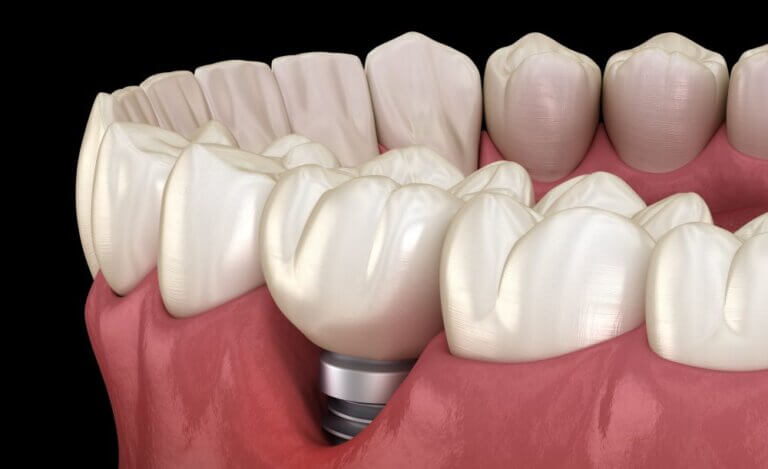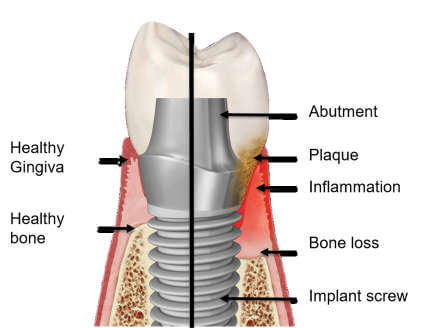Dental Implant Failure

What Is Dental Implant Failure?
Dental implants are one of the most popular and effective solutions for replacing missing teeth. They are designed to provide a strong and stable foundation for artificial teeth such as dental implant crowns or dental implant bridges, allowing patients to restore their smile and bite function. However, despite their high success rate, dental implants can fail for various reasons, which can cause pain, discomfort, and even the loss of the implant.
Before you contact a Toronto dentist to examine possible Dental Implant Failure, there are some things you should know as a patient:
- Why Do I Have Dental Implant Failure?
- Signs And Symptoms Of Dental Implant Failure
- Treatment Options For Dental Implant Failure
- How To Prevent Dental Implant Failure
- Managing Dental Implant Failure Until You Can See The Dentist
If you have questions about Dental Implant Failure or other dental problems, please contact us for more information.
Why Do I Have Dental Implant Failure?
There are various reasons why a dental implant can fail. Understanding these causes can help you take necessary measures to avoid implant failure. Some of the most common causes of include:
- Poor oral hygiene: Neglecting proper oral hygiene can cause dental infection and gum disease, which can lead to implant failure. Therefore, it’s crucial to follow a consistent oral hygiene routine to keep your implant and surrounding gums clean and healthy.
- Implant design: The design and placement of the implant can affect its stability and long-term success. Improper dental implant design, size, and placement can cause mechanical stress on the implant, leading to failure.
- Surgical technique: The skill and experience of the surgeon can also affect the success of the implant. Improper surgical technique, such as using excessive force or poor implant placement, can damage the implant and surrounding tissues.
- Medical conditions: Certain medical conditions, such as uncontrolled diabetes, osteoporosis, or autoimmune diseases, can increase the risk of dental implant failure. Therefore, it’s crucial to disclose your medical history and medications to your dentist before undergoing implant surgery.
- Smoking: Smoking can negatively affect the healing process and increase the risk of infection, which can lead to implant failure. Therefore, quitting smoking before and after implant surgery is recommended.
- Alcohol consumption: Excessive alcohol consumption can impair the body’s ability to heal and increase the risk of dental implant failure. Therefore, it’s important to limit alcohol intake during the healing process.
- Poor nutrition: A balanced and healthy diet is essential for proper healing and the success of dental implants. Poor nutrition, such as a high sugar or acidic diet, can negatively impact the implant’s integration with the jawbone.
By understanding the causes of dental implant failure, you can take necessary precautions to prevent implant failure and ensure the longevity of your implant. If you have questions about the causes of Dental Implant Failure or other dental problems, please contact us for more information.
Signs And Symptoms Of Dental Implant Failure
While dental implant failure is rare, it’s essential to be aware of the signs and symptoms to take necessary action and prevent any potential complications. Here are some of the most common signs and symptoms of dental implant failure:
- Pain and discomfort: Pain and discomfort around the implant site, especially when biting or chewing, can be a sign of implant failure. It can indicate bone loss, infection, or mechanical stress on the implant.
- Mobility: A stable dental implant should not move or shift from its position. If you notice any mobility or looseness of the implant, it could be a sign of implant failure.
- Peri-implantitis: Infection around the dental implant site is called peri-implantitis. It is caused by the buildup of bacteria and plaque around the implant site, which leads to inflammation and infection of the surrounding gum tissue. Other symptoms include inflammation, redness, tenderness, pus discharge, bad breath, and fever.
- Gum recession: Receding gums around the implant site can expose the dental implant’s metal surface and compromise its stability. It can also lead to bone loss and implant failure.
- Changes in bite: Changes in the bite or occlusion can indicate implant failure. It can cause discomfort when biting or chewing, indicating a problem with the implant’s positioning or stability.
If you experience any of these signs or symptoms, it’s essential to consult your dentist immediately. Early intervention can prevent any potential complications and increase the chances of salvaging the implant. For more information about signs and symptoms of Dental Implant Failure or other dental problems, please contact us.

Treatment Options For Dental Implant Failure
If you experience dental implant failure, your dentist may recommend various treatment options based on the severity and cause of the failure. Here are some of the most common treatment options for dental implant failure:
- Removal of the implant: If the implant has failed due to infection or mechanical stress, your dentist may recommend removing the implant, also called explantation. The dentist will then clean the area, and if possible, put in a bone graft or new dental implant immediately.
- Bone grafting: If the implant has failed due to bone loss, your dentist may recommend bone grafting to rebuild the bone structure and support a new implant.
- Immediate dental implant placement: In some cases, your dentist may be able to immediately place a new dental implant after the removal of the failed implant. For this to be possible, there must be sufficient bone to support the new implant. Otherwise, the dentist will graft the bone defect and wait for new bone growth before attempting dental implant surgery.
Early treatment intervention can increase the chances of salvaging the implant and prevent any potential complications. If you have questions about treatment options related to Dental Implant Failure or other dental problems, please contact us for more information.

How To Prevent Dental Implant Failure
While dental implant failure can happen due to various reasons, there are steps you can take to reduce the risk of failure. Here are some ways to prevent dental implant failure:
- Follow our dental implant surgery post-operative instructions: Following your dentist’s post-operative instructions, such as avoiding biting on hard or sticky foods on the dental implant, and practicing good oral hygiene.
- Good oral hygiene: Practicing good oral hygiene habits, such as brushing twice a day, flossing daily, and using an antibacterial mouthwash, can help prevent infections that can lead to dental implant failure.
- Regular dental visits: Regular dental visits can help your dentist monitor the health of your implant and identify any potential issues early on, preventing implant failure.
- Avoid smoking: Smoking can increase the risk of implant failure by impairing the healing process and compromising the dental implant’s stability. Quitting smoking or avoiding it altogether can reduce the risk of implant failure.
By following these preventive measures, you can increase the lifespan of your implant and reduce the risk of dental implant failure. It’s essential to discuss any concerns or questions with your dentist and follow their recommendations to maintain optimal oral health. For more information about how to prevent Dental Implant Failure or other dental problems, please contact us.
Managing Dental Implant Failure Until You Can See The Dentist
If you think you may be experiencing dental implant failure and cannot see your dentist immediately, there are some things you can do to manage the situation until your appointment:
- Keep the area clean: Gently brush and rinse the area around the dental implant with an antibacterial mouthwash to prevent infections. We recommend you choose a gum care toothpaste like Crest Pro Health Gum Detoxify Deep Clean Toothpaste, a gum care mouthwash like Crest Gum Care Mouthwash Oral Rinse, and make daily use of water flosser like the Waterpik Aquarius Water Flosser
- Avoid chewing on the affected side: Avoid putting any pressure on the affected side of your mouth to prevent further damage to the implant or surrounding tissue.
- Apply cold compress: If you experience pain or swelling, apply a cold compress to the affected area to reduce inflammation and discomfort.
- Over-the-counter pain relievers: Over-the-counter pain relievers can help alleviate pain and discomfort temporarily. You are also welcome to use over the counter pain relievers such as ibuprofen (Advil) or acetaminophen (Tylenol). Ask your dentist what dosage is right for you, but if you do not have a pre-existing medical condition of allergies, 1000mg acetaminophen (Tylenol) with 600mg ibuprofen (Advil) every 4-6 hours or as needed is a very powerful combination.
- Soft foods: Stick to a soft diet that includes foods such as soup, mashed potatoes, and yogurt to avoid irritating the dental implant site.
Remember, these are temporary measures, and it’s crucial to see your dentist as soon as possible to address the underlying cause of the implant failure. Your dentist can evaluate the situation and recommend appropriate treatment options to restore the health and function of your implant. For more information about how to manage Dental Implant Failure or other dental problems, please contact us.

